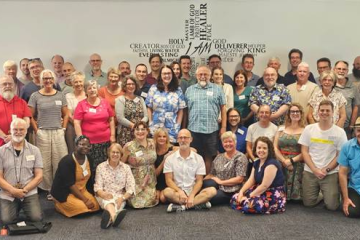Family – Ephesians 5:21-6:9
Two years before Aron and I moved to Japan in 1995, Crown Prince (at the time) Naruhito and Princess Masako were married. Masako worked for the Japanese Ministry of Foreign Affairs before her marriage. She was the daughter of a senior diplomat and spoke six languages: Japanese, English, Russian, French, Spanish and German. She’d graduated with distinction from Harvard, studied at Balliol College, Oxford, received a law degree from Tokyo University. (If you’ve gone to Tokyo – you are smart!) But all the talk, even two years later when we reached Japan, was about their first press conference, where Masako had spoken for 39 seconds longer than her husband to be!
It was a clear example of how household codes, cultural expectations of how relationships are ordered, are applied in real life. As a foreigner living in Japan, there were frequent reminders – tangible reminders – of gender inequality. (I have some show and tell this morning.) In traditional dinnerware, men’s cups and bowls were larger than women’s cups and bowls. Women spoke differently. They had to speak deferentially to men. My sister was astonished – when she visited – to hear me being apologetic as I gave directions to the taxi driver. Women had their baths last – after the rest of the household. There was one positive – women’s haircuts were cheaper than men’s!
This section of Ephesians, the fifth in our series, takes all the theological statements that have been made – about being ‘in Christ’, about being made one with Christ and each other; about the amazing place where this happens called the church; and how we, as the church, are called to embody God’s love to our world – it takes all these theological statements and says, “Here’s what this looks like in real life, in day to day life, in your household and my household. Here are household codes for the community of faith.”
There are a number of these codes in the New Testament; Colossians 3:18-4:1, 1 Timothy 2:9-15, Titus 2:2-10 , 1 Peter 2:13-3:7 and this one in Ephesians, and a lot has been written about them! There’s an inherent tension, I think, in codifying Christian behaviour in a way that is practical and relevant at one point in time and the role of Scripture which speaks into our lives at every time – which is, “useful for teaching, for reproof, for correction, for training in righteousness…(2 Tim 3:16-17) [which] is inspired by God…so that everyone who belongs to God may be… equipped for every good work”. And so, household codes are controversial. Even as Western denominations wrestle with ethical questions about human sexuality we have still not resolved issues of gender or our treatment of the most vulnerable.
But despite its challenges, this text tells us three things about ourselves as the community of faith: that we are necessarily shaped by our culture, by the life lived around us; that we are also – thank God! – shaped by God’s calling, by the life within us, and, finally, that we are being shaped by the Spirit of God for a way of life ahead of us.
And this is what we see in this passage. The New Testament household codes were based on Greco-Roman household codes from the teaching of Aristotle and other first century philosophers. Relationships were listed in binary pairs (“The smallest and primary parts of the household,” Aristotle wrote, “are master and slave, husband and wife, father and children.”) and they reflected the view that a man’s authority over his household was critical to the success of society. First century philosopher Arius Didymus proclaimed, “The man has the rule of this household by nature. For the deliberative faculty of the woman is inferior, in children it does not yet exist, and in the case of slaves it is completely absent.”
And there were good reasons for the early church to align itself with these codes. Australian theologian, Michael F. Bird, writes, “The household codes [were] not ideal, but [were] a necessary way of negotiating a path for Christian assemblies in a world there [they] were viewed with the utmost of suspicion.” And Sharyn Dowd, former Associate Professor at Baylor University, observes that this system was included, “because it was the only stable and respectable system anyone knew about. It was the best the culture had to offer.”
Similarly, we are shaped by the culture we are in – for good and for ill. We live in a society that is individualistic, that measures worth on external factors, appearance and buying power, and that erodes our responsibility for each other. As Christians, we must resist this pressure. On the other hand, positive pressure can be exerted by society on the Christian community. The Royal Commission into Institutional Responses to Child Sexual Abuse has turned a glaring spotlight on how patriarchal structures allowed abuse to occur and covered up that abuse. The recommendations from the Commission that include empowering children’s participation codify for us Ephesians 5:21,”Submit to one another out of reverence for Christ.”
But the household codes also reveal that the Christian community was also transformed by the life of God within it.
In contrast to the Greco-Roman household codes, the New Testament codes address themselves first to those with less power: wives, children (including grown children), and slaves – because these were the people who made up the church! And where Greco-Roman codes asked nothing of heads of households, here they are told to love their wives as they love themselves – an extraordinary statement in the first century – to be gentle with their children and be just and fair to their slaves – also extraordinary!
And all parties are called to re-think their roles and relationships, their lives, in the light of their Christian identity (the metaphor of Christ and church is one of mutual love and mutual service); to remember we are all members of one body, all servants of one Master, all children of one God, a God who shows no partiality.
This thinking has had a radical impact on the shape of the church. I mentioned not so long ago how this thinking – that we are friends of God and therefore friends of each other – led a group in the mid- 1600s to call themselves ‘The Society of Friends’ (also known as Quakers) and to form distinctive egalitarian communities, without class divisions and with shared responsibilities between men and women…communities which advocated for causes like abolition – the end of slavery – and women’s rights. “It all seemed pretty obvious to them: friends did not let friends be held in slavery.”
We can look at other campaigns that have championed workers rights or even the current Baptist World Aid Ethical Fashion Guide as originating in this passage.
And the shaping of the Christian community continues. We continue to grow as the body of Christ (chapter 4), joining ligaments, achieving full functionality, building up in love. We are learning to be more like God (chapter 5, verse 1) and we are being filled (verse 18) with the Spirit of God – it is a process – as we learn how to be God’s people, and as part of that process (our translations separate verse 21 from the preceding verses but it is part of the same thought) we are learning how to submit to one another out of reverence to Christ.
I am so glad of that because I am aware we have a long way to go, in our relationships with the vulnerable, with those who are exploited, with children and in our attitudes to gender and gender roles within the church.
I have been reading a lot this week about family violence and the sad reality that it is present within church communities According to some surveys, it is present to the same degree as it is outside the church; there is little to suggest any protective effect of church attendance on the perpetration of domestic violence.
A Just Cause and BaptistCare have produced some excellent resources and there are even more on the Common Grace site – I will provide a link to them in Sunday to Sunday this week. There, Anglican minister Erica Hamence writes:
I want us to have the conversation(s) we need to have about headship….[a conversation that could open up] a broader reinvestigation of how we deal with power more generally, how we empower men and women in our communities, whether there are cultures within our churches which diminish women, …cultures of blame…whether we will develop greater reserves of grace and generosity… whether we will find in the gospel the shape of the response needed.”
How do we keep being filled with the Spirit of God as we work out how to submit to one another in reverence to Christ? It’s not a household code, but psychologist Kylie Pidgeon has these practical suggestions for churches working towards modelling mutual equality and respect:
- Provide equal encouragement and opportunity to women, as to men, to develop (upfront, outspoken) preaching and teaching roles
- Develop a public procedure for the ideas and concerns of women to be prioritised on the church agenda.
- Give deep thought to the inclusivity of all people within the life, direction, and leadership of the church.
- Train and appoint multiple female (and male) pastoral carers who know how to respond well to the dynamics of family violence
- Change who does the behind-the scenes work. Encourage women to do church building maintenance and financial management. Equally consider men for roles such as morning teas, cleaning, and event coordination.
- Be specifically inclusive of those on the margins within the church. Consider those with disabilities, divorced or unmarried members, and those who identify as LGBTIQ.
We are being filled. We are working out what mutual submission look like. And I know I’ve gone on a bit longer this morning – this was a big subject and hard to compress down – but I want to finish with a story about working things out.
Yesterday Peter Churcher told me about trying to make his mother’s bran loaf this week. But the recipe she’d written said things like, “A little bit of this… A little bit of that..” and the loaf when made – was not a success – unless you need new building materials! So, he rang his sister who said she’d tried it and also failed, but had a few suggestions, and then her husband rang Pete’s other sister, who rang Pete with her suggestions. This reminded me also of a story James told me of trying to make his aunt’s cheesecake after she passed away. How he experimented for two years – trying this, trying that – until he got the recipe right.
And that’s what we are doing. We are trying a bit of this, trying a bit of that; trying to be aware when things are not working; asking for forgiveness when we get it wrong, until eventually we are filled with the Spirit of God – we have the recipe right – and we submit to one another out of reverence for Christ.


